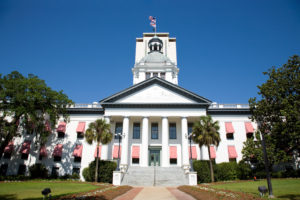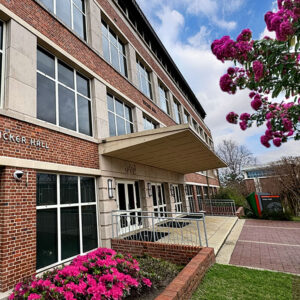Politics | February 4th, 2024
Cash registers sing when lawmakers come to town
By: Tianna Fannell | Staff Writer

As we move into the fourth week of Tallahassee’s annual legislative session, the impact on the local business community is becoming increasingly evident. This time of year, typically characterized by intensive political activity, translates into a bustling period for downtown businesses. Establishments like Olive Garden and Chuck’s Seafood are experiencing a surge in customers, prompting managers like Naibet Gonzalez to adapt quickly.
This uptick in activity not only signifies the legislative session’s direct impact on local businesses, but also highlights the importance of agility and foresight in maximizing the economic opportunities it presents. For downtown Tallahassee, this period is not just about political decisions, it’s a crucial economic phase where adaptability and strategic planning play key roles in leveraging the influx of lawmakers and their staff.
“We get busier and 40% of the business is during lunch hours and peak dinner hours,” Ms. Gonzalez highlights, emphasizing the need for robust planning and leveraging local suppliers to ensure smooth operations.
Adapting to Increased Demand
The filing of over 1,600 bills during this session is not just a political event but a catalyst for economic growth in Tallahassee. Businesses are extending their service hours and bolstering their inventory in response to the surge in customer traffic. This adaptability is crucial for local establishments to thrive during such periods of heightened activity, underlining the symbiotic relationship between the legislative session and the local economy, as emphasized in reports from sources like Florida Realtors.
The surge in Tallahassee’s restaurant industry during the legislative session is a clear indicator of its broader economic impact. Among the establishments adjusting to this uptick is Chuck’s Fish, ideally situated near the capital and thus at the heart of this heightened activity. Natasha Bills, the General Manager, observes a tangible relationship between the legislative session’s proceedings and the restaurant’s business.
“The sales and traffic absolutely [increases] during that 60-day period,” Mrs. Bills of Chuck’s Fish in Tallahassee explains.
This increase is reflective of a broader trend seen across the city’s dining scene during the legislative session. Restaurants transform into vibrant gathering spots not only for legislators and lobbyists but also for the local community. The influx of professionals to the city drives higher patronage across various dining venues, turning them into bustling hubs of activity and interaction. This heightened business activity during the session illustrates the significant impact of political events on local commerce, infusing energy into the city’s culinary and social fabric.
The Economic Ripple Effect of Political Activity
In addition to the increased business, Olive Garden manager Naibet Gonzalez points out the employment opportunities arising during the legislative session. With a workforce largely comprised of college students, the restaurant adjusts its hiring strategy to ensure smooth operations while respecting the schedules of its student employees.
“We hire more which allows jobs for people so during this period we can work with everyone’s schedule,” Ms. Gonzalez explains.
According to the National Restaurant Association, strategies like Olive Garden’s increased hiring during peak seasons, such as legislative sessions, are beneficial for both businesses and communities. This approach helps manage higher customer volumes while offering flexible job opportunities, particularly valuable in student-populated cities like Tallahassee. It exemplifies an effective response to seasonal demand fluctuations, contributing positively to local employment and the overall economy.
During this period, local establishments such as Chuck’s Fish and Olive Garden are witnessing a significant surge in business. The increased patronage vividly illustrates the interplay between political events and the stimulation of local economic growth. According to Florida Politics, legislative sessions that commence in March, like the current one, typically see a more substantial increase in economic activity for these businesses, underscoring the direct impact of these political gatherings on the local business environment.
Naibet Gonzalez, managing the restaurant, shares her approach “We normally get supplies from Orlando, but during this busy period, we often need to turn to local markets for additional goods.”
This method not only ensures the smooth functioning of the restaurant but also supports local markets, highlighting the session’s expansive economic influence. This reliance on nearby suppliers during peak legislative times illustrates the interconnected nature of the city’s economy. Larger businesses and small local vendors become linked in a mutually beneficial relationship, fostering community-wide economic growth. It’s a period when the entire city’s commercial landscape, from small-scale markets to major hospitality players, gets a boost in activity and visibility.
The broad economic effect of the legislative session transcends the hospitality industry, touching retail and other services. The session becomes a period of opportunity for various businesses to increase sales, heighten their community profile, and contribute significantly to the local economy. This dynamic reinforces the need for adaptability and strategic planning among businesses, with those agile enough to respond to the shifting demands benefiting substantially. This scenario serves as a shining example of how political events can drive economic growth and dynamism in a city, turning a legislative session into a period of prosperity for a diverse array of businesses.
This adaptability not only helps in accommodating the increased customer flow but also positions these establishments as integral parts of the city’s social and economic fabric, transforming them into key hubs for dining and networking. During this time, hotels often experience full bookings, indicative of the city’s bustling professional and legislative activities. This situation necessitates strategic responses from businesses within these industries. Hotels and restaurants alike find themselves increasing staffing levels and managing inventory more strategically to uphold service quality despite the increased operational demands. This adaptation is crucial in ensuring smooth functioning during this peak period, as outlined in an article by Florida Jolt.
However, the opportunities presented by the legislative session also bring challenges. The economic surge demands a high level of preparedness from local businesses. Those that cannot swiftly adapt to the increased demand and dynamic market conditions may struggle to keep pace.






